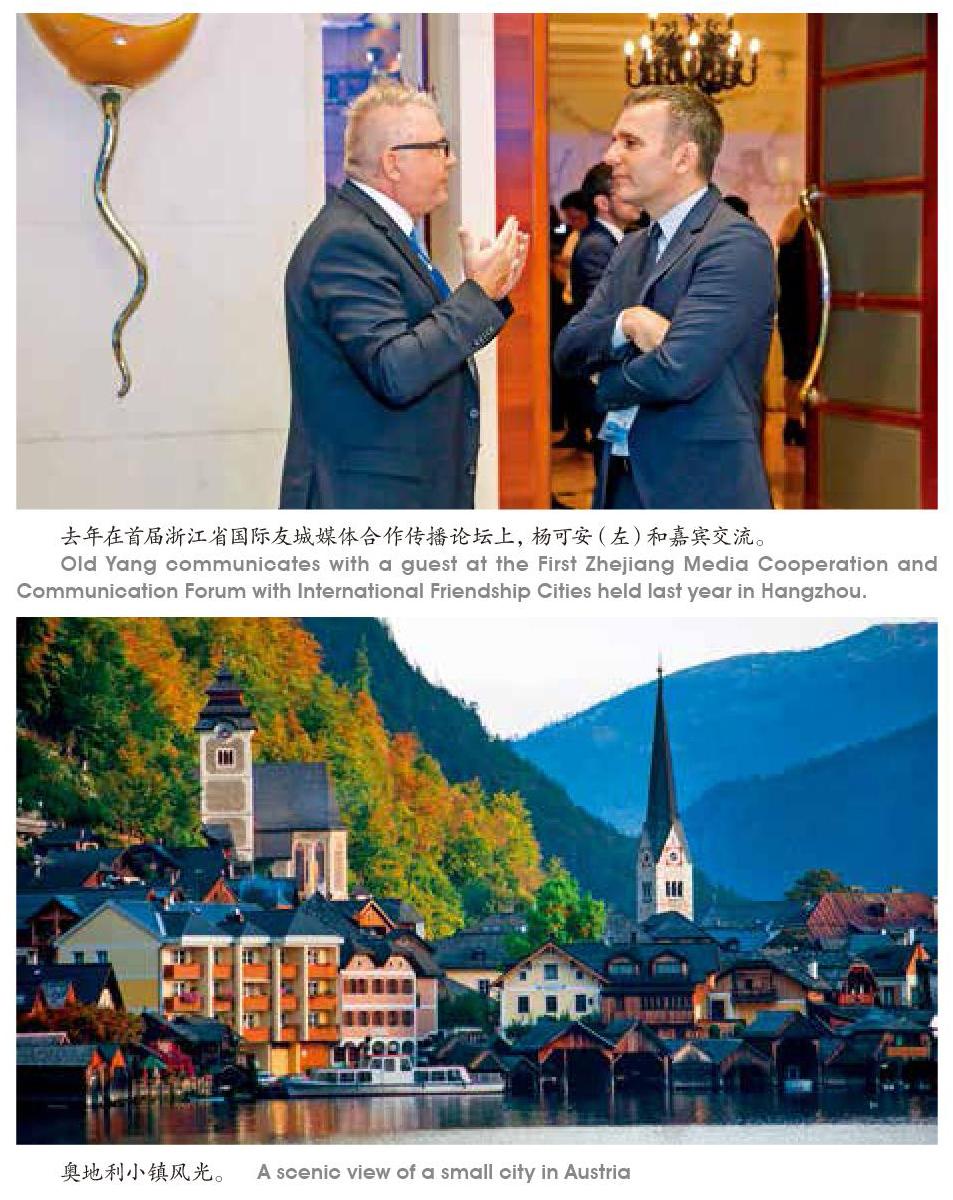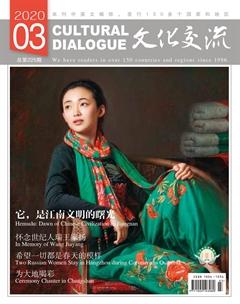海内存知己,天涯若比邻
杨可安

“你好,我是老楊。”每次向中国的合作伙伴作这样的自我介绍时,我都感觉自己真的就是中国人。更准确地说,我是来自奥地利的中国人。
与浙江广电集团合作5年之后,我更为深切地感受到“海内存知己,天涯若比邻”这句唐诗确实所言不虚。就像西方人之间的友情那样,中国朋友之间的友情也不是千山万水可以阻隔的。两人之间一旦缔结友谊,即使远在天涯海角,他们也会彼此怀念。
我是奥地利人,在家乡有亲朋好友,这使得我能更好地欣赏中国和奥地利这两个国家以及她们的文化,尤其是风姿多彩的两国人民。我想借此机会,将奥地利和中国的相似之处作一些比较和分析,虽然两个国家表面上看起来颇为不同。
全世界都知道中国近些年发生了翻天覆地的变化。我多次访问中国,也亲眼见证了这些变化。比如,与你们很多人一样,我观看过杭州湾跨海大桥的视频和照片,但后来当我亲眼看见宏伟壮观的大桥时,我仍深感震撼。另一个例子是杭州人工智能小镇,技术先锋前卫,让我有种跨越时空的错觉。在那个小镇,我一时不知自己身在何处,突然有种感觉,仿佛遇到了比我们的文明要高级很多的外星文明。
每次回家,我在中国生活的照片特别受亲朋好友的欢迎,我似乎总有讲不完的故事。奥地利,这个地处欧洲山地的小国家,对有着14亿人口和远大未来的中国感到好奇。每当我将自己在中国的见闻告诉奥地利同事和亲朋好友时,他们顿感好奇,并将中国作为未来旅行的首选之地。
同样,奥地利的自然美景、精致的传统乡村,以及保存完好的传统文化,也让中国人无限着迷。中国人对相比之下小很多的奥利地也不仅仅是有所耳闻,而是迫不及待地想要加深了解,前来亲眼看一看。
我觉得,两国彼此感兴趣的原因就在于彼此有不少相似之处,尽管这似乎令人不可思议。
维也纳以世界音乐之都而享誉全球,每年都会吸引无数音乐学院学生和旅游者来访。那么我们就以音乐为例。在我看来,奥地利音乐和中国音乐的相似之处,简要来说有以下这些——
中国朋友将受世人尊敬的贝多芬和莫扎特与奥地利音乐紧密联系在一起;而奥地利人一提到中国音乐,首先联想到是古筝、二胡、京剧锣鼓这些乐器,它们演奏出来的旋律如诗如画。然而,古典音乐的代表人物和典型符号让两国精彩绝伦的内涵彰显于世界,却也限制了这两个国家向世界推送质量极高的现代作品。中国拥有的不仅仅是古筝和二胡,同时还有天赋过人的现代艺术家和歌唱家;而奥利地拥有的也不仅仅是贝多芬和莫扎特,还有先锋电子音乐、现代舞、先锋绘画。对这两个国家来说,地位显赫的古典传统艺术是两国人民各自的世界观和自我形象的天然组成部分,因此,他们很难把新潮的和令人激动的新艺术放到相当的高度来对待。从这个意义上看,也可以说奥地利和中国都是繁荣的古典文化的“受害者”。
让我们再看看大家都喜欢的美食。奥地利与中国也有相似与不同之处,但相似大于不同。
奥地利食谱上最受欢迎的菜肴是油炸猪肉片和炖牛肉,而中国则有红烧肉和水煮牛肉。奥中两国都喜欢这些实实在在、能大快朵颐的传统美食。当然,奥中两国都有现代都市大厨,但人们似乎都偏爱妈妈做的拿手菜。两国民众最喜爱的都是肉菜。与中国民众的喜好相似,奥利地人对猪肉也情有独钟。两国民众都喜欢吃肉喝酒。啤酒和葡萄酒的销量都很大。奥地利国产美酒产量不大。目前,奥地利和中国的美酒主要还是在国内消费,在国外难觅踪迹。两国都在努力地让自己的酒类产品获得更广阔的市场,得到更多消费者青睐。也许,两国在这方面联手会更见成效。
接下来,再看大众媒体。自从我对中国有更多的了解后,经常听朋友讲起一些极具中国特色的浪漫爱情故事。在中国,很多爱情源于青梅竹马、两小无猜的时候,往往经历各种坎坷,然后有情人终成眷属,白头偕老。对这样的故事,我内心是有点嫉妒有点羡慕的。我简要说说奥地利的爱情故事。
奥地利地处中欧,我觉得这个地理特点对本国人民的性格有某种影响。传统男女在选择“完美伴侣”时颇为保守,这样使得有些人抱憾终生,有些人孤独终老。奥地利国家广播公司在1997年开播了一档叫做《爱情故事和婚姻问题》的电视节目,至今仍在播出。节目中的受访者都期待相亲。节目组采访这些希望找到终身伴侣的单身人士,尽可能让观众全面了解他们的个性。这档节目迄今已播出23季,每集最初时长25分钟,现已延长至48分钟。作为一档传统的电视相亲节目,不仅未因网络约会相亲的冲击而被取代,反而受到更多观众的喜爱。这档节目之所以长盛不衰,主要是得到广大观众的认可。
但从另一方面来说,奥地利时下的年轻人却未必会循规蹈矩,他们更倾向于在社交平台寻找相亲机遇。在这一点上,他们与中国青年并没什么不同。这样的相亲方式,特别适合当代中国高强度工作环境下的年轻人寻求一种高效的生活方式。
时光飞逝。2019年已然结束。这一年,我最满意的是我与浙江广电集团的友情进一步加深。我以奥地利Okto国家电视台的名义,将我的祝福送给浙江的老朋友们,祝福他们在2020年以及以后很多年万事如意。我希望我们的友情天长地久。无论时间如何飞逝,我们的友情永远不变。我衷心祝愿中国繁荣富强!
(本文部分图片来自CFP)
“Hello, Im Lao Yang.” These days, every time I introduce myself to my Chinese partners, I feel that while Im without doubt Chinese, Im more accurately Chinese-from-Austria. However especially after five years of working with ZRTG, I am compelled to recognize the truth in the old oriental aphorism of “a close friend far away brings a distant land near”, especially true in the traditional Chinese culture. Much like friendships among Westerners, there are no geographical boundaries between Chinese friends, and once two souls recognize each other, even if they are at the two ends of the earth, they will not stop reaching out and communicating frequently. And so my connections with Austria and my old friends back home have made it possible for me to appreciate both countries, their cultures and especially the fascinating peoples of both lands. Id like to take this opportunity to compare and examine the similarities between these two, on the face of it, quite different places.
The world knows well enough the major changes that have taken place in China in recent years, and I have personally witnessed them on my frequent visits. For example, like many of you, I had seen footage and images of Hangzhou Bay Sea-crossing Bridge, but it wasnt until I saw it with my own eyes, that the awe of immersion truly gripped me. Another example is the technological avant-garde across time and space of AI town in Hangzhou, which left me unable to define just where I was, and quite suddenly, I had the illusion of encountering an alien civilization much more advanced than our own.
When I talked to my colleagues and friends in Austria about what I had seen in China, they were instantly curious and put it on top of their travel list in the future. Similarly, Chinese people are endlessly attracted by the natural beauty, quaint villages and unspoiled traditions Austria is home to. Showing pictures of my life here is a popular activity when I return home – it seems I can never tell enough stories about this, by comparison, tiny place in the mountains of Europe. Austrians are fascinated by a land of 1.4 billion people that often seems made of the future. Chinese in turn have not only heard of this much smaller land, they cant wait to hear more about it and come to visit. Perhaps the reason can be found in the similarities, however unlikely they might seem, between the two countries.
Consider Austrian and Chinese music. Vienna, the city known as the musical capital of the world, has attracted countless conservatory students andtourists to visit it over the years. In those overseas minds, the similarities between Austrian music and Chinese music boil down to the following. Chinese friends associate Austrian music with the venerable Beethoven and Mozart; likewise, when Austrians mention Chinese music, their associations are the poetic and picturesque charm of as well as , the gongs and drums of Beijing Opera. While these symbols of classical music help the two countries to promote their own national quintessence to the world, they also limit the opportunity of promoting the contemporary musical art both places undoubtedly produce in great quality and quantity. Just as there are not only and in China, but also talented contemporary artists and singers, there are not only Mozart and Beethoven in Austria, but also avant-garde electronic music, contemporary dance, and avant-garde painting. For both countries the “classical” artistic tradition is so dominant in the perception and self-image of their people, that it can be difficult to find the newer and exciting art that is being made. It could be said that both countries are ‘victims of their own historical success, in this way.
Let us turn our attention to another one of the great pleasures shared by both Austrians and Chinese: food. The food culture in Austria has both similarities and differences with China. The similarities seem to outweigh the differences, however. Just consider that where the most broadly available and celebrated dishes on the Austrian menu are Schnitzels (pork escalope) and Tafelspitz (stewed beef), China has Red braised pork belly, and chili cooked beef. Both countries enjoy what you might call traditional, honest and hearty fare. While there are of course modern, urban chefs working in both countries, the majority seems happy with ‘mothers cooking. The most popular dishes in both countries are meat-related. And similar to Chinese meat ingredients, Austria is also a country with a big veneration for pork as the main meat ingredient. Austrians, like their Chinese counterparts, enjoy a good drink with their porky delights. The beer and wine consumption is high in both countries, Austria is known for high wine quality from small production amounts. So far, Austrian and Chinese wines have both been sold mainly domestically, and they are hard to find overseas. Both countries are shifting gears to ensure their wines and beers are more broadly marketed and consumed. Perhaps a partnership amongst both countries could be fruitful here?
Next, lets look at popular media. I have been hearing some Chinese-styled romantic love stories from my friends since I began to know China better. Many of those stories began with the innocent friendships of childhood, and after numerous ups and downs, they develop into a stable couple, and their love will usually last a lifetime. While my heart is envious, I would also like to talk a bit about the Austrian-styled love story. In my opinion, the geographical location of Austria in central Europe has a certain influence on the character of the local people. Traditional Austrian women and men can be quite conservative in the selection of “the perfect partner”. This leads to occasional disappointments and lonely souls. For this, Austrian national broadcasting invented a TV format called “Love Stories and Marriage Matters”, which has been broadcasted since 1997. It is a program consisting of interviewing people with dating wishes. It visits those singles looking for their life partners, drawing as complete an image of the candidate's personality as possible for the audience. So far, 23 seasons have been produced, and the duration of each episode has been extended from the initial 25 minutes to the current 48 minutes. As a traditional TV dating program, it has not been replaced under the impact of online dating. On the contrary, it becomes more and more popular every year. It has something to do with the recognition of the strong audience of die-hard fans behind it. On the other hand, young Austrian generations wouldnt follow the traditional route—which is similar to those of China—it is also quite common for them to screen dating opportunities through online platforms. This is suitable for an efficient lifestyle under the high-intensity work conditions we must deal with in contemporary China.
How time flies! The end of 2019 is upon us. And my greatest satisfaction of this year should be my friendship with ZRTG becoming deeper. For the upcoming 2020 and the years to come, and, on behalf of Okto TV, Austria, Id like to send my dear old friends of ZRTG an Austrian greeting. And I hope our friendship will last forever—no matter how time flies, what remains changeless is our friendship. And I wish China have a more prosperous future!

